Intermarkets' Privacy Policy
Donate to Ace of Spades HQ!
aceofspadeshq at gee mail.com
Buck:
buck.throckmorton at protonmail.com
CBD:
cbd at cutjibnewsletter.com
joe mannix:
mannix2024 at proton.me
MisHum:
petmorons at gee mail.com
J.J. Sefton:
sefton at cutjibnewsletter.com
Speculation: The "Ground Forces" Phase of This War May Be Fought Entirely With Drone Hunter-Killers
Virginia's New AWFUL Governor, a "Moderate" Democrat and CIA Stooge, Releases Illegal Alien Arrested Over 30 Times to the Streets; He Immediately Stabs a US Citizen to Death at Bus Stop
Iranian Liberation Dance Party Goes Worldwide
THE MORNING RANT: Any Refund of Tariffs Already Collected Should Go to Taxpayers, not Businesses
Mid-Morning Art Thread
The Morning Report — 3/2/26
Daily Tech News 2 March 2026
Sunday Overnight Open Thread - March 1, 2026 [Doof]
Gun Thread: First March Edition!
Food Thread: Carbon Steel For The Loss!
Jim Sunk New Dawn 2025
Jewells45 2025
Bandersnatch 2024
GnuBreed 2024
Captain Hate 2023
moon_over_vermont 2023
westminsterdogshow 2023
Ann Wilson(Empire1) 2022
Dave In Texas 2022
Jesse in D.C. 2022
OregonMuse 2022
redc1c4 2021
Tami 2021
Chavez the Hugo 2020
Ibguy 2020
Rickl 2019
Joffen 2014
maildrop62 at proton dot me
Saturday Evening Movie Thread 03-14-2020 [Hosted By: TheJamesMadison]
Terry Gilliam
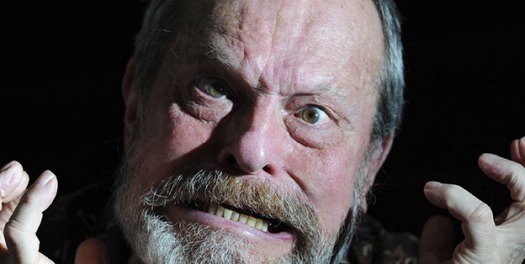
I love Terry Gilliam as a filmmaker. He’s talented enough technically, adept enough narratively, and singular enough visually to really stand out amongst his peers, despite only having thirteen feature films to his name (one of which is a co-director’s credit).
Starting in animation, moving to television comedy with Monty Python, and then using that to start a film directing career, Gilliam approached film like an animator. The stories of the making of Monty Python and the Holy Grail are full of the other Pythons getting beyond frustrated with Gilliam as he demanded certain visual elements to be just right. John Cleese got so irritated with the Minnesotan’s visual perfection that he questioned how it was going to make the material funnier, in between constant shouting matches and Gilliam walking off the set a couple of times.
That obstinacy and particularity on Gilliam’s part is what sets him apart. He’s a director tied to a particular vision. Being in the real world, he finds ways to work with others to make it happen, compromising where he can, but he’ll also dig in his heels and make his vision happen if he feels it necessary. Watching all of his movies and listening to him talk a bunch, I think there’s a clear point after which he becomes unbending, and that’s the completion of the script. It’s most obvious when he talks about his troubles with the movie Brazil, wondering how the producer who tried to wrest control of the film from him in post-production could suddenly want a movie that was different from the script that they had agreed upon. He had filmed the script, and suddenly the producer wanted another movie? No, he wasn’t going to bend after he had shot and cut everything together.
Visuals
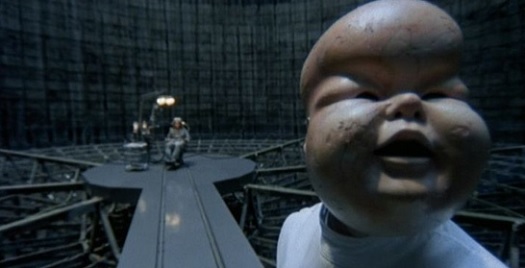
One of the first things people think of regarding Terry Gilliam films is the look of them. It’s actually quite distinctive because of two main reasons. The first is a heavy prevalence for wide-angle lenses, especially in close ups. This creates a fishbowl-like effect where the subject’s face seems distorted at the edges and everything to the sides curves. This distortion is intentional and related to the second major visual tic of Gilliam’s. He uses a lot of Dutch angles, where the camera is slightly tilted to the side to create slanted frames and compositions.
These two things combine together to create the easily discernible Gilliamesque look that is prevalent in every picture, but he doesn’t use them all the time. That’s because he uses these visual tricks very purposefully as a way to support the story.
Theme
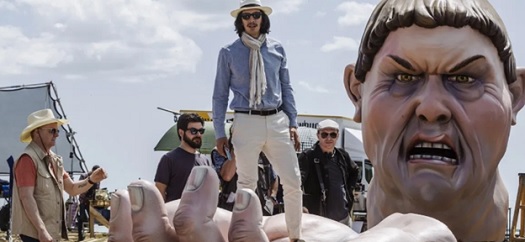
One of the things that you notice about film directors with strong authorial streaks is the consistency of the ideas that they pursue. Bergman had several that he cycled through in his long career from God’s silence to the nature of women. Hitchcock used voyeurism. Kubrick did a lot with dehumanization. Terry Gilliam is in the same boat, and all of his movies, literally all of them, deal with the idea of the intersection of fantasy and reality. That can be stated a couple of different ways, but I think the best way to say it is materialism vs. fantasy.
At the core of Gilliam’s work is this idea that the material world is not enough for the human spirit. Kevin from Time Bandits dreams of places lost to the centuries. Sam Lowry in Brazil dreams of flying with wings and saving his dream girl from industrialized monsters. Duke from Fear and Loathing in Las Vegas rebels against the squares around him through drugs and anarchic rebellion. Toby in The Man Who Killed Don Quixote learns that cynical materialism is empty and embraces the mantel of Don Quixote by the end of the film. Jack in The Fisher King is racked with guilt and only finds solace by embracing the fantasy of a billionaire keeping the Holy Grail on his bookshelf in New York.
They all deal with the same core idea, but they also treat them differently. The most interesting contrast would be between Brazil and The Zero Theorem. In Brazil, Sam ends up catatonic after his rebellion against the oppressive bureaucratic state to try and make his fantasies some level of reality fails, the real life manifestation of his dream woman is killed by the state, and Sam is tortured into madness. In The Zero Theorem Qohen finds his existence meaningless, and he’s intent on waiting by his phone for a call that will give his life meaning. He ends up stuck in an internet program of a perpetual sunsetting beach where he finally finds solace embracing his own meaning from within. On the one hand, Sam reaches out to make meaning in his life and gets destroyed for it, relegated to madness. On the other, Qohen learns that meaning cannot come from without, but must come from within, and he ends up satisfied. The fact that we never have that final shot of Qohen outside the program, catatonic like Sam, implies that Qohen’s ending is actually happy for him.
It’s the same idea approached differently in each film. He’s repeating things, but providing enough thematic exploration from one to the next so that he doesn’t get repetitive.
Fantasy
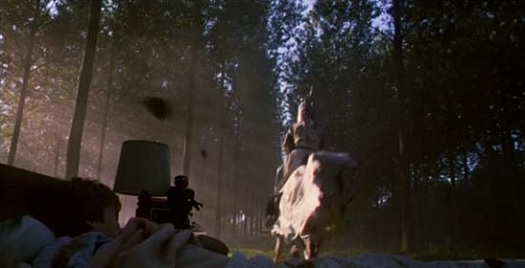
To bring the two ideas together (the visuals and the theme), it’s important to talk about how Gilliam presents fantasy.
The use of things like Dutch angles is done mostly in order to imply that the audience is seeing something that’s not quite right. There’s something wrong about seeing an image that doesn’t line up with how we see the world (which is mostly based on a horizontal perspective with peripheries), so to see an image that’s tilted tells the audience that they’re viewing something different from strict reality.
It’s also the key to really unlocking what Gilliam is doing about the intersection between fantasy and reality that permeates his films. He can use outlandish sets, costumes, and performances, but if he’s filming it straight, then it’s an intentional choice to imply that the outlandish things that you are seeing are more real than the more realistic looking images presented at a tilt.
Movies pass along information in a variety of ways, and it’s not always through dialogue. Gilliam approaches the visuals of his films like an animator, ensuring that they tell as much of the story as the written word. His are some of the movies that you really need to watch not just because they’re usually visual delights (The Zero Theorem and Tideland are the rather cramped and ugly exceptions) but because he’s actively using his camera to help tell the story.
But what about those sets and costumes? The Adventures of Baron Munchausen is really the height of that. It’s where he got the most money (it was the third most expensive movie ever produced at the time) and filmed at Cinecitta in Rome using great Italian talent to create an expansive world that encompassed a city invaded by the Turks, the moon (done cheaply as a cost saving measure, but still striking), Hephaestus’ living space in a volcano, on a ship inside a giant fish, and ending with a giant battle. It’s not his tightest film, but it’s easily his most visually sumptuous.
The closest he got to that again was when he made The Brothers Grimm almost twenty years later. The physical elements are fantastic and fun, but they overestimated what they could accomplish with CGI and didn’t do what they did that well, creating a weird effect of nothing looking like it exists in the same space. He would later use the cartoonish CGI to much better effect in The Imaginarium of Doctor Parnassus where he used unrealistic visual effects to create worlds of the mind behind a magic mirror.
Structure
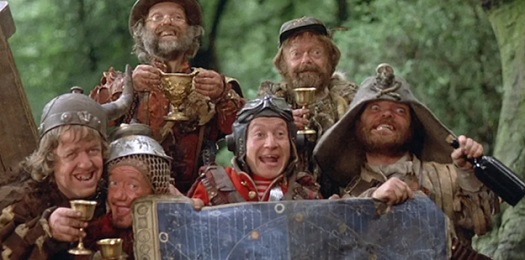 /
/
That being said, Gilliam has some terrible narrative instincts. As I referred to earlier, he’s happy to work with people at the scripting stage to bring ideas together more fully, but once cameras roll he’s going to film what’s on the page. The nadir of his narrative abilities is, I think, Tideland where a young girl has a series of events that happen around her as she tries to navigate life without her parents. He co-wrote the script with Tony Grisoni based on the novel by Mitch Cullin, and it feels like something he just shot without as much thought as he could. It was filmed in a break of post-production on The Brothers Grimm due to a fight with the Weinstein Brothers, so the accelerated schedule could attribute to a lot of this.
The height of his narrative, though, is, in my opinion, Brazil. Brazil was written first with his long term writing partner, Charles McKeown with whom he wrote The Adventures of Baron Munchausen and The Imaginarium of Doctor Parnassus. However, unlike those two (which both show the director’s almost trademark narrative looseness), Brazil is surprisingly tight, and it has everything to do with Tom Stoppard. Stoppard has a writing credit on the film, but he attributes very little of his own contributions to the end results. However, listening to Gilliam talk about Stoppard’s contributions, it’s obvious that Stoppard provided the glue that brought together all of Gilliam’s different ideas into a cohesive whole. The one contribution that Gilliam usually mentions is the use of the bug that falls into the typewriter at the start of the film, causing the mess that follows. It’s a small detail, but it perfectly falls in with the idea of the overall film. It’s a mistake that no one will own and everyone involved in the process never questions the materials before them, pushing off blame to anyone else.
Without that strong glue early, Gilliam tends to let his movies search around for ideas. It’s amazing that many of them are as cohesive as they are, almost flying apart at the seams despite themselves. It’s also no coincidence that some of Gilliam’s best films (in particular Twelve Monkeys and The Fisher King) were entirely written by other people.
Actors
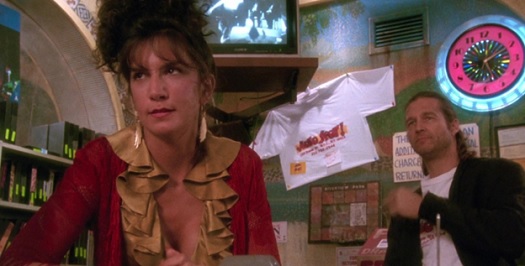
One thing that, I think, gets overlooked a lot when looking at Terry Gilliam is his ability with actors. It’s often a shorthand to refer to directors by a type. Visualists, technicians, storytellers are all rather common, but one that I almost never see applied to Gilliam specifically is “actor’s director”, and I think it fits him perfectly.
It seems like most people forget, but he’s directed several actors to Oscar nominations and one to an actual win (that would be Mercedes Ruehl for Best Supporting Actress in The Fisher King). It’s a slight argument by authority, but I don’t think it should be ignored that he’s directed both Brad Pitt and Robin Williams to nominations.
However, stepping away from the cesspool that is the Academy and just looking at the work itself, it’s obvious that Gilliam has a strong rapport with his actors. Performances can end up manic in Gilliam’s hands, but it always feels appropriate. Jonathon Pryce as Sam Lowry and Don Quixote are both large, but they also speak to the characters’ inner struggles as they try to reconcile their inner lives with the world around them. Bruce Willis gives one of his finest performances in Twelve Monkeys as Cole, the man out of time, and there should always be attention placed on Madeleine Stowe who provides the very firm rock on which the audience rests in the chaotic narrative.
He's even very good with children. Craig Warnock is a fantastic protagonist as Kevin in Time Bandits When Sarah Polley doesn’t get lost in the sets and effects, she’s a little firecracker as Sally in The Adventures of Baron Munchausen. And, as much as I don’t like the movie overall, Jodelle Ferland is quite good as Jeliza-Rose in Tideland.
You may get lucky with a great performance if you don’t have the chops to help mold one as a film director. Casting is big and hiring Robin Williams to be alternatively manic and soulful is one reason you hire the man. But getting consistently good performances from actors indicates an ability to connect with them and forge their performances towards the emotional truth that is undergirding the film overall. This is a really underappreciated element in Gilliam’s work.
In Conclusion
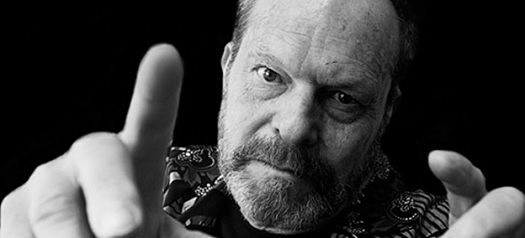
The man probably only has one, maybe two more movies left in him. It’s not that he’s running out of juice (I think the final version of The Man Who Killed Don Quixote is one of his finest films), but it takes him years to get the money together and release a film. I can’t imagine him going for more than ten more years and we’ll be lucky if he gets out two movies in that time.
I think his ability to connect with actors, combined with his intelligent use of visuals at the service of his (often chaotic) stories makes him one of the strongest voices in modern film. He’s a cinematic treasure with influences ranging from The Thief of Baghdad starring Douglas Fairbanks to Jacques Tati. He’s a singular filmmaker, and, while I don’t think all of his films are complete successes, I enjoy so much of his filmography that I’m happy to take the few stumbles along with the more numerous and incredible highs.
If you haven’t seen his stuff, I highly, highly recommend you start.
Voting!
Last time I asked for nominations for best film of 2019, and you gave them to me. I’ve created the below poll for you to respond.
And, a note to those who nominated They Shall Not Grow Old, I actually gave it a special award last year. Check it out here. Don’t comment, though.
Movies of Today
Opening in Theaters:
Bloodshot
The Hunt
Next in my Netflix Queue:
Death Becomes Her
Movies I Saw This Fortnight:
Time Bandits (Rating 3/4) Full Review "It's messy just like Gilliam's imagination, but it's also infectious and fun. There's a wide-eyed optimism that mixes well with a steely-eyed cynicism, all told in the form of a children's story that challenges its audience and treats them intelligently." [Personal Collection]
Brazil (Rating 4/4) Full Review "It’s the greatest combination of his visual aesthetic and a script he ever worked on. It’s well acted, well photographed, and done on a huge canvas that can capture the breadth of his imagination." [Personal Collection]
The Fisher King (Rating 3.5/4) Full Review "Where The Adventures of Baron Munchausen felt like a step backwards for Gilliam, The Fisher King feels like a leap back forward." [Library]
Twelve Monkeys (Rating 4/4) Full Review "It’s a very good movie, produced well, and with a surprisingly smooth production history, that stands as one of Gilliam’s finest works." [Personal Collection]
The Brothers Grimm (Rating 2/4) Full Review "I imagine that a longer edit might have addressed these things, but I suppose that’s just something we’ll never see." [Amazon Prime]
The Zero Theorem (Rating 1.5/4) Full Review "This movie has ideas, and it actually handles them with some intelligence, but it doesn’t really come together as a drama. The ideas take greater precedent over the actual storytelling, so the movie ends up suffering." [Library]
The Man Who Killed Don Quixote (Rating 4/4) Full Review "After a second watch of this film, I’m upping my rating from 3.5/4 to 4/4. The movie has really grown on me, and I love it even more." [Personal Collection]
Skyfall (Rating 4/4) Full Review "Mendes came to this project as an obvious fan of the franchise, and he applied every narrative and cinematic trick he had learned in his time as a filmmaker to the series he loved, making one of the best entries in the entire franchise." [Personal Collection]
Contact
Email any suggestions or questions to thejamesmadison.aos at symbol gmail dot com.
Follow me on Twitter.
I've also archived all the old posts here, by request.
I'll add new posts a week after they originally post at the HQ.
Joe Biden, also a nerdy intellectual giant: "Speaking of drunken meatheads, I want to point out ..."
JM in Illinois : "I kinda miss Baghdad Bob. He had such great timin ..."
Serious Cat: "I think it's the other way around. Iran has been s ..."
vmom deport deport deport: "48 Drones > flying carpets Posted by: wth AIs ..."
one hour sober: "I keep hoping someday soon people all over X and o ..."
Cuthbert the Witless: " Afternoon. Is it wrong to be tickled by the fa ..."
Skynet: "[I]They only cost $35,000 each. We can flood the c ..."
illiniwek: "A lot of the Ukraine drones are much smaller off t ..."
can of spam: "I'm seeing unconfirmed reports (which admittedly a ..."
It's me donna : "42 not to be annoying - lol - are we doing a post ..."
XTC: "30 BUT that only works when there are rules. In wa ..."
Speculation: The "Ground Forces" Phase of This War May Be Fought Entirely With Drone Hunter-Killers
Virginia's New AWFUL Governor, a "Moderate" Democrat and CIA Stooge, Releases Illegal Alien Arrested Over 30 Times to the Streets; He Immediately Stabs a US Citizen to Death at Bus Stop
Iranian Liberation Dance Party Goes Worldwide
THE MORNING RANT: Any Refund of Tariffs Already Collected Should Go to Taxpayers, not Businesses
Mid-Morning Art Thread
The Morning Report — 3/2/26
Daily Tech News 2 March 2026
Sunday Overnight Open Thread - March 1, 2026 [Doof]
Gun Thread: First March Edition!
Food Thread: Carbon Steel For The Loss!
Paul Anka Haiku Contest Announcement
Integrity SAT's: Entrance Exam for Paul Anka's Band
AllahPundit's Paul Anka 45's Collection
AnkaPundit: Paul Anka Takes Over the Site for a Weekend (Continues through to Monday's postings)
George Bush Slices Don Rumsfeld Like an F*ckin' Hammer
Democratic Forays into Erotica
New Shows On Gore's DNC/MTV Network
Nicknames for Potatoes, By People Who Really Hate Potatoes
Star Wars Euphemisms for Self-Abuse
Signs You're at an Iraqi "Wedding Party"
Signs Your Clown Has Gone Bad
Signs That You, Geroge Michael, Should Probably Just Give It Up
Signs of Hip-Hop Influence on John Kerry
NYT Headlines Spinning Bush's Jobs Boom
Things People Are More Likely to Say Than "Did You Hear What Al Franken Said Yesterday?"
Signs that Paul Krugman Has Lost His Frickin' Mind
All-Time Best NBA Players, According to Senator Robert Byrd
Other Bad Things About the Jews, According to the Koran
Signs That David Letterman Just Doesn't Care Anymore
Examples of Bob Kerrey's Insufferable Racial Jackassery
Signs Andy Rooney Is Going Senile
Other Judgments Dick Clarke Made About Condi Rice Based on Her Appearance
Collective Names for Groups of People
John Kerry's Other Vietnam Super-Pets
Cool Things About the XM8 Assault Rifle
Media-Approved Facts About the Democrat Spy
Changes to Make Christianity More "Inclusive"
Secret John Kerry Senatorial Accomplishments
John Edwards Campaign Excuses
John Kerry Pick-Up Lines
Changes Liberal Senator George Michell Will Make at Disney
Torments in Dog-Hell
The Ace of Spades HQ Sex-for-Money Skankathon
A D&D Guide to the Democratic Candidates
Margaret Cho: Just Not Funny
More Margaret Cho Abuse
Margaret Cho: Still Not Funny
Iraqi Prisoner Claims He Was Raped... By Woman
Wonkette Announces "Morning Zoo" Format
John Kerry's "Plan" Causes Surrender of Moqtada al-Sadr's Militia
World Muslim Leaders Apologize for Nick Berg's Beheading
Michael Moore Goes on Lunchtime Manhattan Death-Spree
Milestone: Oliver Willis Posts 400th "Fake News Article" Referencing Britney Spears
Liberal Economists Rue a "New Decade of Greed"
Artificial Insouciance: Maureen Dowd's Word Processor Revolts Against Her Numbing Imbecility
Intelligence Officials Eye Blogs for Tips
They Done Found Us Out, Cletus: Intrepid Internet Detective Figures Out Our Master Plan
Shock: Josh Marshall Almost Mentions Sarin Discovery in Iraq
Leather-Clad Biker Freaks Terrorize Australian Town
When Clinton Was President, Torture Was Cool
What Wonkette Means When She Explains What Tina Brown Means
Wonkette's Stand-Up Act
Wankette HQ Gay-Rumors Du Jour
Here's What's Bugging Me: Goose and Slider
My Own Micah Wright Style Confession of Dishonesty
Outraged "Conservatives" React to the FMA
An On-Line Impression of Dennis Miller Having Sex with a Kodiak Bear
The Story the Rightwing Media Refuses to Report!
Our Lunch with David "Glengarry Glen Ross" Mamet
The House of Love: Paul Krugman
A Michael Moore Mystery (TM)
The Dowd-O-Matic!
Liberal Consistency and Other Myths
Kepler's Laws of Liberal Media Bias
John Kerry-- The Splunge! Candidate
"Divisive" Politics & "Attacks on Patriotism" (very long)
The Donkey ("The Raven" parody)

